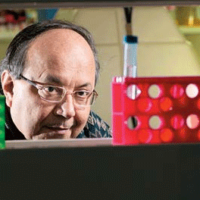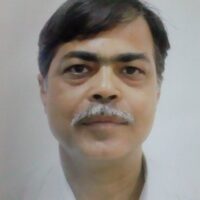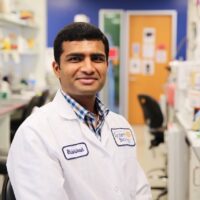Sohan Modak was a Professor at the Pune University and he studied chick developmental biology. He was an influential teacher and mentor. He was one of the driving forces behind setting up the first five Biotechnology teaching centres in the country. He was the G N Ramachandran Senior Fellow at IGIB and played an important role in developing the curricula for the IGIB PhD Program Coursework.
Samir. K. Brahmachari
The life of Prof. Sohan Modak did not come to an end with his death, for he will live on forever in the minds of scores of people who interacted with him in any manner, as a student, a teacher, an educationist, or a researcher. A teacher par excellence, Prof. Modak, in the very first place, revolutionized postgraduate teaching of biology in India. An eminent cell and molecular biologist of his time, he brought revolutionary changes in imparting classroom and laboratory training in the then newly, among first, created department of biotechnology in the Pune University. His professional excellence influenced generations of students and scientists alike in the entire country. Besides science per se, he also passionately taught how to ask questions in biology, how to follow most appropriate research methodology, and how not to compromise with research ethics and integrity at any time. Prof. Modak’s contribution to Indian science is unparalleled. A living legend just a few days ago, his legacy will continue for generations to come through whom he directly interacted with and through word of mouth.
-Abhay Sharma
Prof. Modak is no more, but the funny, sparkling moments he created remain fresh in my mind. My first encounter with him was when he interrupted my carefully prepared talk on microRNAs at a conference with the statement “It is a degradation product” with an accompanying smirk that had my blood boiling. After the talk, I had to corner him and from there we went back and forth with rationale and counter-argument over several sessions spread over weeks. But in place of the obstinate, know-all I expected, I found a refined critic and defending the project against his arguments, my thoughts clarified and crystalized. Later, I would seek him out and subject myself to these uncomfortable sessions to “think”. He was on constant vigil to identify scientific fraud, with no qualms about pulling up well-established senior scientists, even as he would be gentler to young scientists who were unaware of issues like plagiarism.
Another time he organized developmental biology classes introducing us to chick early development which none of us had any intention of pursuing. But sitting in his class for fun, as a young teacher, I saw that classroom transform into a theater and the intricacies of jargon-loaded developmental biology take on a movie-like quality. When I got some meager allowance to travel to Switzerland, he generously offered the use of his vacant house in scenic Lausanne. Empty houses can speak- in this little, sparsely furnished one bedroom flat, there were about a hundred books that reflected the wide ranging interests of the owner, even the broken leg of a cot was held up by a stack of books. Later, whenever my IGIB friends would go to Pune, we would have an evening of good natured banter at his Pune home. Introducing us to exotic cheeses and wine, he was always dangerously close to being a snob, but instead became the generous professor under whose guidance, many first-time experiences bloomed.
Lastly, I want to pass on a valuable lesson he shared with me. When my son was a toddler, he once sat me down and told me “how” to play with him. Apparently, and in retrospect, correctly, many parents get into “showing” the child how to build a Lego house or assemble a toy train set. The Modak way is to sit fumbling with the parts, in plain view of the child until the toddler takes pity on you and starts helping you. Indeed, whenever I curb my natural impatience and try this, it is magic! With students and children alike. And that is what made Modak special- every fun moment was a teaching moment and every life situation was a classroom. I hope one day I can be as generous and yet as demanding, for another generation of students.
-Beena Pillai
When I heard the news my heart sank. I was hoping to meet Prof. Modak during our next visit back home. He was one of the best teachers I have ever had. Had I not met him, my life would have been very different. I would have never joined IGIB, never worked with Beena Pillai or Lee Hood, or just be where I am now in my life. There are not a lot of people in your life that you can say the same about. For me his teachings went beyond the classroom. He taught me perseverance and tenacity, but also to enjoy life. I frequently remember a guideline he told his students: “In science, don’t believe even your mother.” He questioned our results and method, but trusted his students. During my master’s when we were learning developmental biology, molecular biology, and bioinformatics, we had a key to his house. After the PhD, I stayed with him over a month to finish a manuscript. I ate and drank with him. It is rare to find teachers who are willing to mentor in the way that he did. Over the years, I also had a privilege of knowing his family. I cherished Sharmila ma’am being in Delhi when I moved there for my PhD. His passion for life was infectious, be it while teaching, doing science, or his various activist projects in Pune. If someone wrote a book about him they would not be able to capture all of the wild and varied experiences he had; I would feel lucky to have done even half of what he accomplished. I will miss him!!
-Rhishikesh Bargaje






To us, his students at the Pune University, he was the ‘BOSS’, invariably dressed in faded denims and T-shirts of bold hues – shocking pink, copper sulfate canary yellow, etc. with his spects perched precariously on his nose or resting on his paunch. He would wear high-heeled shoes that would go ‘khat’ ‘khat’ on our first floor corridor, leading to the molecular biology lab. We would hear hushed tones of ‘boss’, ‘boss’ alerting everyone till the far end of the lab. He would stop and enquire, with his characteristic smirk, what we were doing – be the MSc students, PhD scholars, or the post docs. While the rest of us would answer (with our hearts thumping) invariably, Sharmila (later his better half) would look him in the eye and talk! He liked us to be bold, look staight into his eyes and talk, even disagree with him if need be. Most of the time, post office hours, during his interactions with his students, he would get into verbal and physical scuffles with his male post docs, anecdotes relayed to us with much relish the next day!
But, by far, he was an excellent teacher, an extraordinary, talented, and true human being.
His life and his contribution to the field of developmental biology will always be remembered.